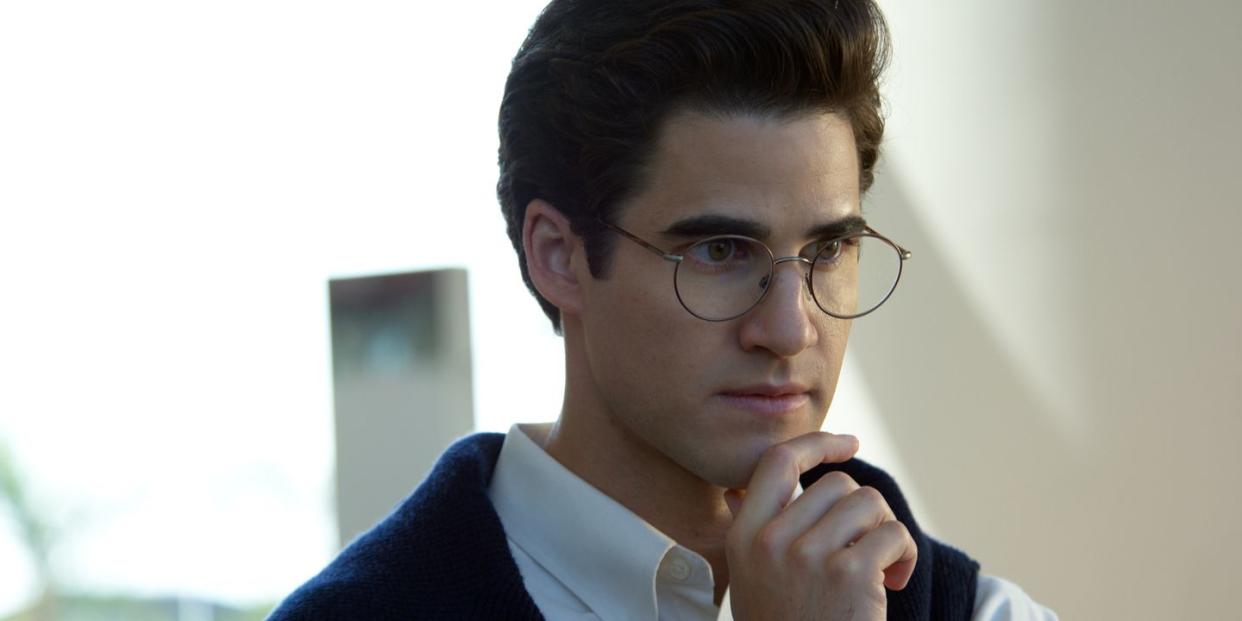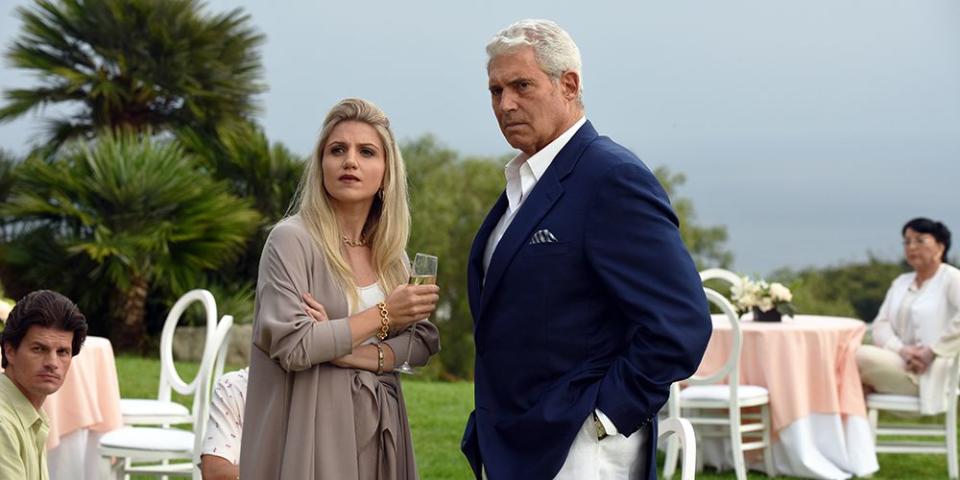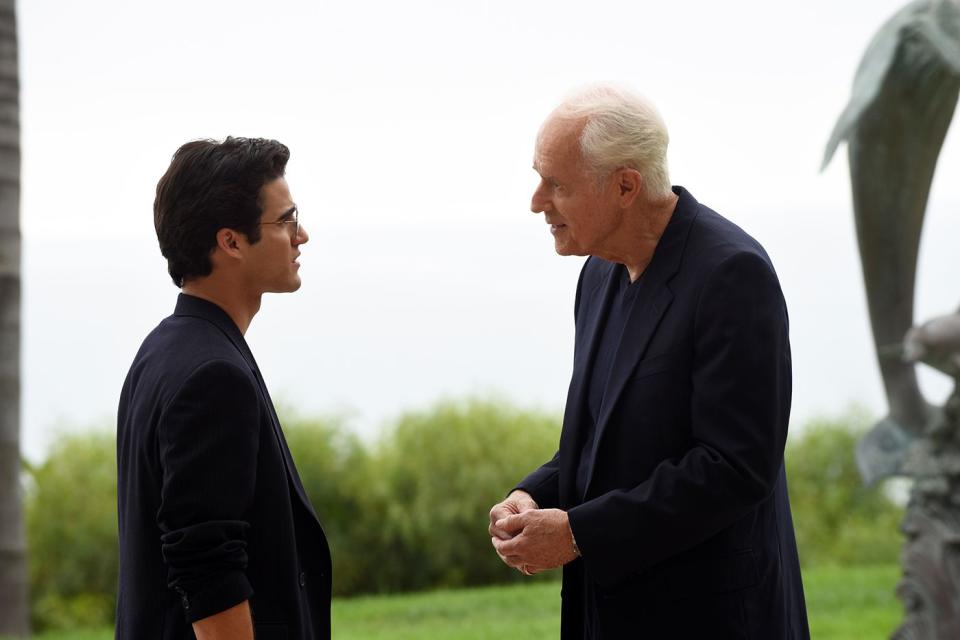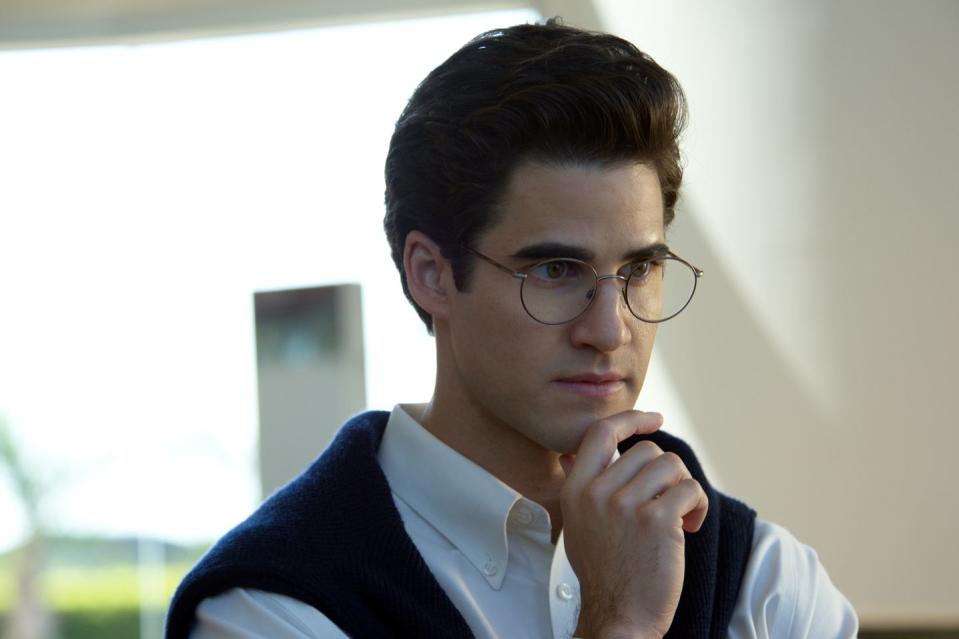'Versace' Episode 6 Sees Cunanan Start to Unravel

The Assassination of Giani Versace is back after a two-week hiatus, and Episode 6 delves into the not-quite-yet-murderous - but still utterly horrifying - Andrew Cunanan of 1995. Though he's still repressing his violent urges at this point, Cunanan's relentless thirst is on full display during his 26th birthday party in California, a lavish and deeply fraught affair that ends up marking the start of Andrew's descent into violent madness.
Here are five talking points from tonight's appropriately titled episode, "Descent."
1) The opening moments emphasize the biggest fact vs. fiction divide in this show.
In brief: Andrew Cunanan’s physique. In Vulgar Favors, the book upon which this series is based, author Maureen Orth notes on several occasions that Cunanan gained a large amount of weight towards the end of his life - unusually for a crystal meth user, he had a big appetite, and was apparently self-conscious about his body in contrast to the chiseled physique that was de rigueur in the gay community. Let's just say that this... is not the case with Darren Criss's Cunanan, whose slammin' bod has been on display through earlier episodes this season, and is highlighted in this opening sequence.
Andrew arrives at a palatial house in California, strips naked and takes a swim in the pool. It's the kind of ostentatiously luxurious setting in which he's most at home - but of course, the house is not his. It belongs to Norman Blachford, the wealthy older man who allegedly "kept" and bankrolled Cunanan for several years before the murders. Though the real-life nature of Cunanan and Blachford's relationship is still unknown to this day, American Crime Story posits them as a couple. On the show, Andrew tries to pretend he's just Norman's interior designer, and that he has his own apartment back in New York, but the truth behind their "arrangement" is clear to everyone who attends the party.

2) Despite being entirely murder-free, Andrew's birthday party is the show's most excruciating sequence yet.
Despite his involvement with Norman, Andrew still thinks he can have it both ways - he'll keep the wealthy older companion to pay for his lifestyle, while also pursuing what he sees as true love with David. "He's a future," Andrew tells Lizzie of David, "and so far I've only dated the past." He's determined to win David, and in order to do that, he wants to transform himself into "someone David can love." This sounds like a touching sentiment, until you remember that it's coming from Andrew Cunanan.
Andrew's version of being "someone David can love" turns out to mean peacocking - and he ropes poor Jeff Trail, who at this point is still a real friend, into playing along. He gives Jeff a lavish gift to give back to him at the party, which is one of the most obnoxiously extra moves I have ever seen on screen - not to mention rude as hell, since Jeff brought an actual gift - and also gives him a nicer pair of shoes to wear. Jeff draws the line at pretending to still be a naval officer, and later in the episode, he and Andrew come to blows over that postcard we heard about in Episode 4, with Jeff openly accusing Andrew of trying to out him.
Andrew's lies are beginning to catch up with him and clash with each other, and the party sequence culminates with a photograph that really sums up this messy collision of Andrew's two worlds. On one side of Andrew, Norman and Lee Miglin; on the other, David and Jeff, who have only just met but have already struck up a warm, easy rapport that's infuriating Andrew. "It's everyone I love in one photo!" Andrew coos, but there's a manic glint in his eyes from this point on, and it never really goes away.
3) Norman's friend David is having none of Andrew's nonsense.
And it's deeply enjoyable to watch. David sees through Andrew from minute one of this party, and it's clear from their interaction that this mutual dislike goes back some way. David sees Andrew as the opportunist he is, taking advantage of Norman in a vulnerable moment following the death of Norman's longtime partner from AIDS.
“What a volatile mix you are,” David tells Andrew, in one of several catty, telling, exchanges. “Too lazy to work, and too proud to be kept.” That line lays the groundwork for Norman and Andrew’s eventual separation, which comes after Andrew presents a list of absurd demands to Norman in exchange for continuing their relationship. By now, Norman has looked into Andrew enough to figure out that "Andrew De Silva" is an alias, and just about everything he’s ever said about his past is a lie.
What’s amazing, though, is that all this lying isn’t a deal-breaker for Norman - he’s willing to overlook it. What he’s not willing to overlook is Andrew’s laziness, and when he offers to pay for Andrew to go back to college and finish his degree, it prompts a rare moment of honesty. “What is it about education and work that you find so insulting?” asks Norman, to which Andrew spits, “It’s ordinary!” They’re at a stalemate, and so Andrew smashes a glass table and storms out with the admittedly fabulous closing line “I expect you to call.” Spoiler: Norman will not call.

4) There was, at one point, the possibility of something real between Andrew and David.
Thanks to the show’s reverse chronology, the history of these relationships is deliberately ambiguous, and so it hasn’t been clear up until now whether Andrew’s obsession with David is fully delusional, or whether it sprung from something real. But "Descent" suggests that it’s the latter. Andrew makes yet another desperate grand gesture, flying David first-class to California for a spontaneous getaway at a luxury hotel, and though David is clearly on his guard, he still seems somewhat genuinely charmed.
“I wanted to see if we could take the next step,” he admits to Andrew, but tells him that their first night together in San Francisco - a meeting we’re yet to see on screen - meant more to Andrew than it did to David. “I get the feeling you don’t have that many great nights with people,” David says, with real empathy. “So when you do, it feels huge.”
Andrew insists he’s willing to do anything if David will give their relationship a chance, and so David calls his bluff, and asks him to tell the truth. “Get rid of all this,” he says, moving them away from the lavish three-course room service dinner and earnestly asking Andrew to give him a genuine moment for once.
And for a few seconds, it feels like Andrew might actually do it. He begins to tell what seems to be truth about his father, a stockbroker for Merrill Lynch who has now returned to the Philippines. But then the truth gives way to a lie, and David gets visibly sadder and angrier as the lies keep coming. As it turns out, telling the truth about himself is the one thing Andrew won’t do, even for David.
5) Andrew Cunanan and Gianni Versace meet again.
In a crystal meth-fueled dream sequence after his getaway with David falls apart, Andrew visits Versace’s store, where Gianni himself is waiting to serve him. Bathed in hellish red lighting, Andrew complains about how many people have taken and taken from him, and how “this world has wasted me, while it has turned you, Mr Versace, into a star.”
Dream Gianni is calmly taking Andrew’s measurements through this rant, but when Andrew tries to draw a parallel between their lives, he has to object. “You think you’re better than me, but we’re the same," Andrew says. "The only difference is you got lucky." Gianni’s reply cuts right to the heart of everything that drives Andrew’s rage: “Not the only difference, sir. I’m loved.”
What’s interesting about this is it’s an overt dream sequence, but Gianni and Andrew’s opera date in the first episode can also be interpreted as a dream - even Darren Criss himself is not convinced it wasn’t. “As we were shooting it, I was like, Is this just in Andrew's head?” he told Esquire. “We don't know! The grandeur of the show in general is almost like a machination of Andrew's brain. There's a beauty and a color and a sweeping, operatic feel to the show that feels like we're seeing it through the eyes of an unreliable narrator.”

6) Andrew’s visit to his mother is a sad, scary interlude that hints at the upbringing that shaped him.
On the one hand, Andrew’s mother is clearly devoted to him - he’s ecstatic to see him, and bathes him while singing an Italian lullaby, in a sequence that’s both moving and creepy. On the other, though, her love seems extremely conditional on Andrew’s success. Everything she says to him, almost without exception, is about his “accomplishments," which are, of course, pure fiction. She’s particularly thrilled that Andrew is traveling the world with Gianni Versace designing costumes for operas. She’s so preoccupied with his success that she’s not actually listening to him at all, and chooses not to notice that he’s clearly in crisis; when he says outright that he’s unhappy, she acts as though he hasn’t spoken. As it turns out, this visit to his mother’s house came right before Andrew’s visit to Minneapolis, where his murder spree began. “They have an opera house in Minneapolis?” his mom asks, sunnily, and in a truly great line delivery from Criss, Andrew replies: “No, mom. I don’t think they do.”
You Might Also Like